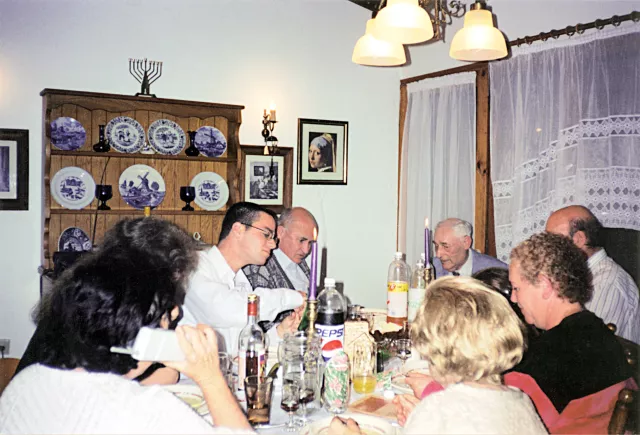This is a picture of me (in the center) with members of my family on Passover 1994 in Israel.
For centuries it has been the Jews' dream to return to Israel. Every year at Passover they wished each other: 'ba-shanah ha-baa be-Yerushalayim' [Hebrew: next year in Jerusalem]. For hundreds of years it wasn't possible - Turkey, the Arabs, the British protectorate [British Mandate]. I grew up in a Zionist family, and my parents also strove for the establishment of a Jewish state.
I thought about moving to Israel many times. There were always various obstacles, though, that prevented me from doing so. Before the war I wanted to finish school first and then I was called up into the army. Later on, when I was in Israel for the first time - in 1956 - I even had a job lined up. But here in Poland my wife had responsibilities - she had to care for her mother.
I remember that first trip. I had a lot of trouble getting permission to go, but in the end I succeeded. When our ship sailed into the port of Haifa, the whole family was already on the quayside. I went to Rywa and Josif's house; they bred chickens at the time. They didn't even have a gas cooker then. My brother-in-law had a donkey, which he harnessed up to a cart and drove me around so that I could look at the sea. Now when we go over there with the family, everything is totally different. The last time I was in Israel was in 1999. We had separate rooms to ourselves. During the day we went swimming and sunbathed. In the morning there was coffee, tea, milk and cocoa. And lots of vegetables because there are vegetables all year round there - not like here - they have everything there.
I still remember the way we used to observe Passover before World War II:
Before Passover help was organized for the poor. Volunteers reported, and they got flour and water and kneaded this matzah. The matzot that were baked then were round - not rectangular like they are today. Then the matzot was distributed to the poor.
Passover was one of the most solemn festivals. The whole family gathered round the table; there was beautiful crockery and compartments for matzah with colored threads sewn in - each compartment stood for someone different: one for the Israelites, one for the Levites and one for the Priests. [Editor's note: On the seder plate there were three pieces of matzah, which were sometimes placed in a bag sewn specially for the occasion, which had three compartments.] I was the youngest in the family, so I asked the four questions, and my father, the head of the family, answered. There were various cakes and wine. We also said, 'Whoever desires to come in and be our guest, let him enter, let him come in.' Guests were brought round. Later, when I was in the army, I was myself invited to various homes for Passover. There was a glass for the prophet Elijah. The door was opened and we waited for him to come. We would ask our parents why we couldn't see the wine going down in the glass for the prophet. 'Because he just sipped a little bit,' they would answer.
Mieczyslaw Weinryb
The Centropa Collection at USHMM
The Centropa archive has been acquired by the United States Holocaust Memorial Museum in Washington, DC.
USHMM will soon offer a Special Collections page for Centropa.
Academics please note: USHMM can provide you with original language word-for-word transcripts and high resolution photographs. All publications should be credited: "From the Centropa Collection at the United States Memorial Museum in Washington, DC". Please contact collection [at] centropa.org.

























